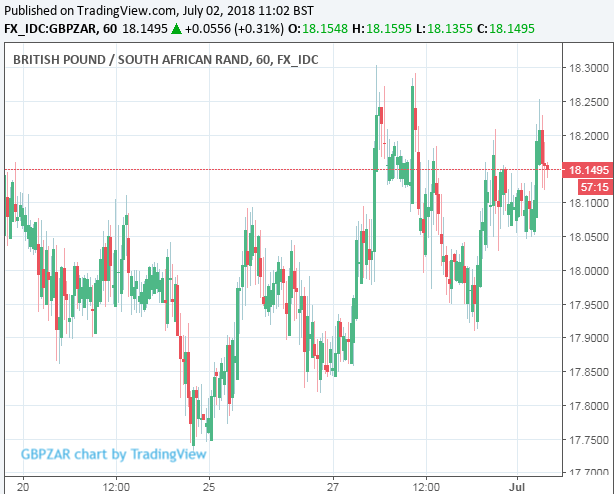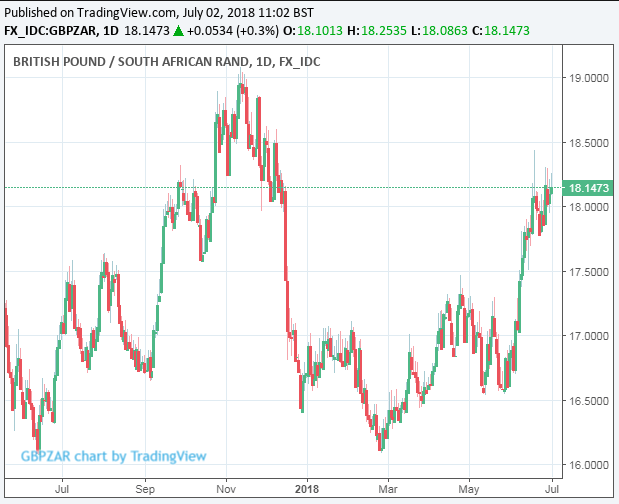Pound-to-Rand Rate Week Ahead: Offshore Factors in the Driving Seat
- Written by: James Skinner

© kasto, Adobe Stock
The Pound is looking stronger against the South African Rand at the start of the new trading week, and new month as an ongoing trend of caution towards the South African currency extends.
The Pound-to-Rand exchange rate is seen climbing as the emerging market currency universe remains under pressure due to unease over President Donald Trump's confrontational trade agenda which, having stoked a stronger US Dollar and widespread risk aversion in global financial markets, is expected to weigh on the Rand again this week.
President Trump has imposed new tariffs on a range of goods imported into the United States from China the European Union, Canada and Mexico, drawing retaliatory levies and threats of further measures to come. Financial markets have taken the tariffs as signs a so called "trade war" is in the pipeline, which has led economists to fear for the global economic outlook and analysts to warn of volatility in currency markets.
The Dollar has been among the greatest beneficiaries of the trade spat so far and the Rand one of its greatest victims given a strong negative correlation with the greenback and an already-tenuous economic outlook. Now, with more than $200 billion worth of US tariffs on imports from China set to go into effect this Friday, some are warning there could be further weakness in store for the South African currency during the days ahead.
"Global equity stocks, the rand and emerging market currencies ended Friday’s trading session on a positive note as the US dollar continued to give up gains following a positive agreement on the EU migration deal," says Mpho Tsebe, an economist at Rand Merchant Bank. "The Rand appreciated by 0.3% against the US Dollar to close at 13.73. However, escalating trade tensions are likely to weigh on equity markets and EM currencies this week."

Above: Pound-to-South-African-Rand rate shown at hourly intervals.
The Pound-to-South-African-Rand rate was quoted 0.32% higher at 18.15 during the morning session Monday and is up 9.1% for the 2018 year to date. The USD/ZAR rate was quoted 0.75% higher at 13.79 and has gained 11.7% in 2018.

Above: Pound-to-South-African-Rand rate shown at weekly intervals.
"Moody’s Rating Agency said “South Africa’s economic growth prospects will be limited by weak business confidence while uncertainty around land and mining reforms remain a concern for investors”, further dampening the currency’s performance. The Rand came very close to touching the R14.00/USD level," says Lara Hodes, an economist at Investec Bank.
In the week ahead, Investec believe the Rand will trade in a range of R13.30 /USD to R14.30/USD and R17.70/GBP to R18.70/GBP."
Advertisement
Get up to 5% more foreign exchange by using a specialist provider to get closer to the real market rate and avoid the gaping spreads charged by your bank when providing currency. Learn more here
Economic Data and Events to Watch for the Pound
The Week Ahead in the UK sees the economic data calendar return to life following a seven-day period in which the few releases of note were all concentrated in the final session of the week.
IHS Markit will release the latest surveys of purchasing managers across the manufacturing, construction and services industries over the first half of the week while a speech from Bank of England governor Mark Carney caps off the week's data on Thursday.
Markets are looking for the IHS Markit Manufacturing PMI, due at 09:30 am on Monday, to slip from 54.4 in May to 54.1 for the month of June. Consensus suggests the construction PMI will rise from 52.5 to 52.6 and that the all-important services PMI should remain steady at 54 when the data are released at 09:30 on Tuesday and Wednesday respectively.
Economists and traders will watch all of these releases closely for an early steer on the likely condition of the UK economy during the final month of the second-quarter. While imperfect as a gauge of overall economic growth, the surveys do provide insight into activity levels within three of the UK's most important economic sectors.
Currency markets care about growth because it has a direct bearing on inflation and it is changes in consumer price pressures that central banks are attempting to manipulate when they tinker with interest rates, which are themselves the raison d'être for most swings in exchange rates. Changes in rates, or hints of them being in the cards, impact currencies because of the push and pull influence they have on international capital flows and their allure for short-term speculators.
The UK economy slowed sharply in the first-quarter so policymakers and economists have been watching for signs as to whether this was a seasonal blip or the beginning of a more protracted slowdown. Thursday Bank of England governor Carney will give an as-yet unspecified speech in Newcastle, England so markets will listen closely for clues as to his latest take on the economy, as well as the outlook for UK interest rates.
Economic Data and Events to Watch for the Rand
The week ahead in South Africa sees only a handful of minor economic data released to the market, which means events in the offshore space are likely to remain in the driving seat for the Rand.
New vehicle sales numbers for the month of June at 13:00 London time on Monday and the market is looking for sales growth of 1.5% on an annual basis, down from 2.9% previously. Many South African made vehicles are exported to other countries and with the global economy still on a robust footing, economists suggest that risks around this number are to the upside.
"We might start seeing a substitution effect into the used vehicle market in coming months, as price inflation rises on the back of a weaker domestic currency, driving up input costs. However, continued robust global growth should benefit new vehicle exports going forward, with exports expected to show substantial upward momentum in the months ahead according to NAAMSA," says Investec's Lara Hodes, in a briefing Monday.
The Standard Bank PMI at 08:15 am London time on Wednesday and electricity production data during the morning hours Thursday. No forecasts were available at the time of writing although the latter half of the week is likely to see currency markets dominated by the implementation of US tariffs against China and a possible escalation of US-EU tensions, particularly for emerging market currencies.
Advertisement
Get up to 5% more foreign exchange by using a specialist provider to get closer to the real market rate and avoid the gaping spreads charged by your bank when providing currency. Learn more here




